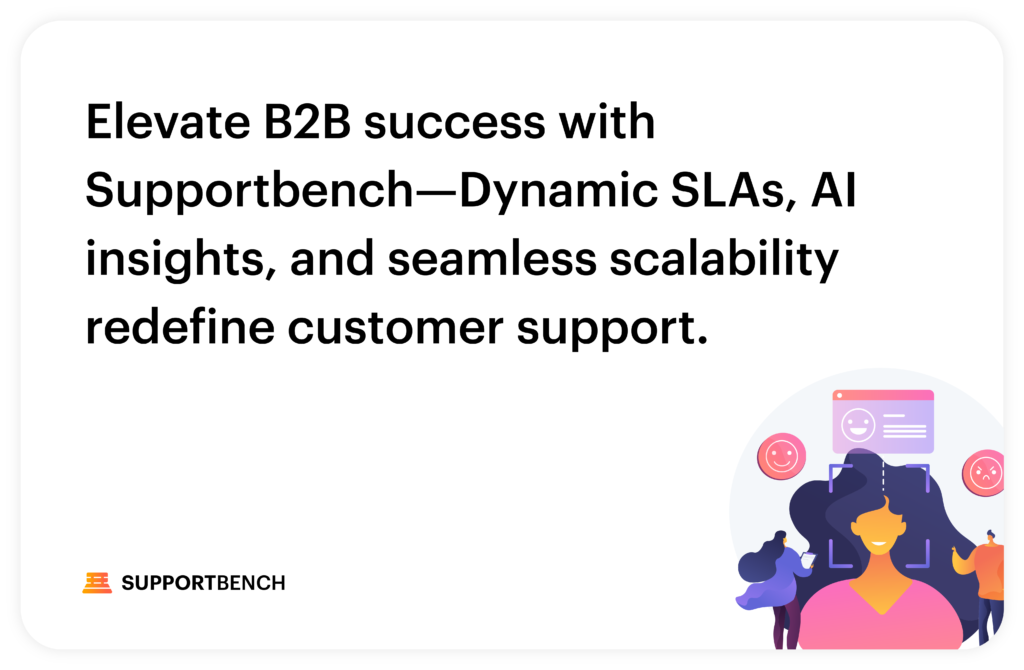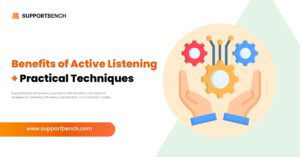We’re more aware than ever before, with B2B interactions, expectations for customer support have soared, turning it into a pivotal element for securing customer loyalty and fostering growth. But, a premium B2B helpdesk, can dramatically alter the trajectory of a B2B company, propelling it towards unprecedented heights of efficiency and customer satisfaction. This transformation is not just about resolving customer issues but about revolutionizing the entire customer support paradigm.

Elevating Customer Satisfaction through Personalized Support
Today, personalized customer support has transcended from a luxury to a necessity. Salesforce’s research underscores this, revealing that 66% of customers expect companies to understand their needs and expectations. Traditional support models often fall short of these expectations. This transition from considering personalized support as a ‘nice-to-have’ to a ‘must-have’ is reshaping how companies approach their customer service strategies. It’s only Modern B2B Helpdesks that are able to stand at the forefront of this transformation, leveraging cutting-edge technologies and innovative features to bridge the gap between customer expectations and the actual support experience.
Here’s a deeper dive into what these newer Helpdesks offer:
Dynamic SLAs (Service Level Agreements)
Dynamic SLAs are a revolutionary feature in the realm of customer support, allowing companies to adjust their response times and support levels based on the specific circumstances of each case. For instance, a high-value client with an urgent issue might warrant a tighter SLA, ensuring they receive a response in a timely manner, which in turn, enhances their overall satisfaction and perception of the company. This level of adaptability ensures that companies can prioritize and manage their support resources more effectively, providing a personalized experience that recognizes and responds to the unique value and needs of each customer.
AI-driven Sentiment Analysis
AI-driven sentiment analysis takes customer support to new heights by enabling companies to understand and respond to the emotional tone of their customers’ communications. By analyzing text for emotional cues, Newer B2B Helpdesks can identify whether a customer is frustrated, happy, or anxious, allowing support teams to tailor their approach accordingly. This capability ensures that customers feel understood on a more personal level, fostering a sense of empathy and connection. When customers feel that their emotional state is acknowledged, it significantly enhances their satisfaction with the support experience.
Intent and Emotional Scoring
Building on sentiment analysis, intent and emotional scoring provide a more nuanced understanding of customer communications. This feature allows a more Modern B2B solution to discern not just the emotional tone but also the underlying intent behind customer queries or complaints. By accurately identifying what customers are trying to achieve, whether it’s seeking information, reporting a problem, or requiring urgent assistance, support teams can offer more targeted and effective solutions. This level of insight ensures that customer interactions are not only empathetic but also highly efficient, further elevating customer satisfaction.
The Impact on Customer Satisfaction
The integration of dynamic SLAs, along with AI-driven sentiment analysis and intent scoring, transforms the customer support process into a highly personalized and responsive system. Customers today seek not just resolutions to their issues but also a support experience that feels tailored to their specific situation and emotional state. By delivering on these expectations, more contemporary Support Solutions not only solves customer problems but also builds deeper customer relationships. This personalized approach results in higher levels of customer satisfaction, loyalty, and ultimately, customer retention.
Enhancing Decision-Making with Data-Driven Insights
The role of data in decision-making processes has become paramount. A report by NewVantage Partners highlights that 99% of business leaders believe data is crucial to their success. Modern B2B Helpdesks capitalize on this by offering deep, actionable insights through customizable dashboards, KPI scorecards, and 360-degree customer overviews. This approach not only enables companies to optimize their support processes based on real-time data but also to continuously improve their performance and customer satisfaction.
Achieving Scalability with Autonomous Support Infrastructure
The scalability of support operations is a critical concern for growing businesses. Gartner predicts that by 2023, over 30% of customer service organizations will implement some form of a virtual customer assistant. For example, Supportbench’s solution, including its AI-driven chatbots and highly adaptable customer portal, allows companies to expand their support capabilities in line with business growth, reducing dependency on IT resources and enabling a more autonomous support infrastructure.
Fostering a Culture of Continuous Learning with KCS
Adopting a Knowledge-Centered Service (KCS) methodology is pivotal for companies aiming to stay ahead in the fast-paced support domain. This approach not only helps in resolving customer issues more efficiently but also aids in creating a self-improving knowledge base. Also, Supportbench’s implementation of KCS methodologies leads to a reduction in repeat tickets and fosters a more knowledgeable support team, directly benefiting the customer.
Streamlining Operations with Advanced Integration Capabilities
Integration capabilities are crucial for a holistic view of the customer and streamlined operations. A study by McKinsey found that companies leveraging customer analytics extensively are more likely to outperform their competitors in sales growth. Supportbench’s ability to seamlessly integrate with other tools and platforms, like Salesforce, centralizes customer data, enabling more informed interactions and operational efficiencies. It’s these new Helpdesks, like Supportbench, that encompass all of these features and benefits in one.
Supportbench isn’t just navigating the currents of change in the B2B helpdesk space; it’s steering the ship. Its commitment to personalized, data-driven support experiences, alongside its focus on scalability, continuous learning, and seamless operations, elevates it from a participant to a pioneer in the field. This revolutionary approach sets a new benchmark, underscoring the indispensable value it offers to companies aiming to refine and enhance their customer support capabilities.
Personalized, Data-Driven Support Experiences
In a digital age where customers expect and demand bespoke interactions, Supportbench’s commitment to personalized support is transformative. Utilizing cutting-edge AI for sentiment analysis and intent detection, Supportbench ensures that every customer interaction is not just a transaction but a tailored experience. This level of personalization isn’t just about addressing the immediate needs but about anticipating future inquiries and preferences, thereby not just meeting but exceeding customer expectations. This approach doesn’t just solve problems; it builds relationships, fostering a sense of loyalty and satisfaction among customers.
Scalability for Growing Businesses
As businesses expand, their customer support needs evolve. Supportbench’s scalable infrastructure is designed to grow alongside your business, ensuring that your support capabilities are not just maintained but enhanced. This scalability is crucial for companies navigating the rapid changes in size and market presence, providing them with the tools to manage increased demand without compromising on the quality of support. By eliminating the constant need for new investments or resources to handle growth, Supportbench allows companies to focus on their core competencies, knowing their support framework is robust and adaptable.
Fostering Continuous Learning
The landscape of customer support is ever-changing, with new challenges and opportunities emerging regularly. Supportbench’s emphasis on continuous learning, particularly through its Knowledge-Centered Service (KCS) methodology, ensures that the support team is always at the forefront of industry best practices. This proactive approach to knowledge management and skill development means that customer support teams are not just reacting to changes but are prepared for them, positioning them as leaders rather than followers in the support domain.
Seamless Operations Through Advanced Integrations
In today’s interconnected digital ecosystem, the ability to integrate seamlessly with a multitude of platforms and tools is invaluable. Supportbench’s advanced integration capabilities, including its synchronization with Salesforce, streamline operations, providing a unified and comprehensive view of the customer. This consolidation of data and functionality means that support teams have immediate access to the information and tools they need to deliver exceptional service, enhancing efficiency and effectiveness.
Supportbench distinguishes itself not merely as a participant in the evolution of B2B Helpdesks, but as a trailblazer setting the direction for the industry. By melding personalized, data-driven support experiences with the scalability needed for growth, a culture of continuous learning, and seamless operational integrations, it redefines what companies can expect from a helpdesk platform. This holistic, innovative approach ensures that businesses equipped with Supportbench are not just prepared to meet the demands of today’s customer support challenges but are poised to excel, driving unparalleled customer satisfaction and success in the competitive B2B landscape. Supportbench, therefore, stands as an invaluable ally for companies seeking to elevate their customer support from a necessary function to a strategic asset, ensuring both the support team’s effectiveness and the company’s overarching success.












